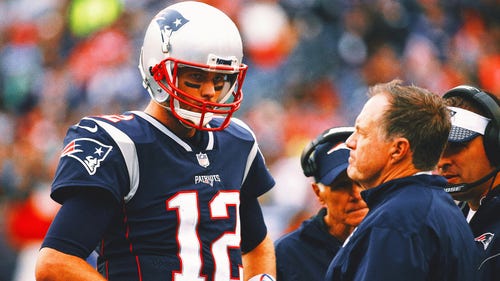
Five most significant excerpts from Tom Brady's appeal hearing
With the help of FOX Sports 1 NFL Insider Mike Garafolo, we've combed through almost 500 pages of legal mumbo jumbo to pull out the five most significant excerpts and exchanges in the Tom Brady Deflategate appeal hearing.
Jeffrey Kessler, Tom Brady's lawyer, asking investigator Ted Wells whether Brady knew about the deflated footballs:
KESSLER: You rejected the testimony of Mr. Brady that he knew nothing about the ball deflation in the AFC Championship Game, right? You rejected that?
WELLS: I did reject it based on my assessment of his credibility and his refusal or decision not to give me what I requested in terms of responsive documents. And that decision, so we can all be clear and I will say it to Mr. Brady, in my almost 40 years of practice, I think that was one of the most ill-advised decisions I have ever seen because it hurt how I viewed his credibility.
KESSLER: If he had given you that, you would have accepted his statement?
WELLS: I do not know. I can't go back in a time machine, but I will say this. It hurt my assessment of his credibility for him to begin his interview by telling me he declined to give me the documents. And I want to say this. At that time, neither his lawyer nor Mr. Brady gave me any reason other than to say, "We respectfully." They were respectful. They said, "We respectfully decline." There wasn't anything about the Union or it wasn't anything (like), "this was what my lawyer told me and I am going to follow my lawyer's advice." I was given no explanation other than, "We respectfully decline." And I did, I walked Mr. Brady through this request in front of his agents and lawyers. So I understood that he understood what I was asking for and they were declining.
+++
Attorney Lorin Reisner, working with Wells' firm, asking in regard to Brady's reaction to the feel of balls after an October game against the Jets:
REISNER: Sometime after the Jets game, what did Mr. Jastremski tell you he learned about the ball?
BRADY: That the balls were, you know, inflated to, you know, much higher than what they were agreed upon before the game.
REISNER: Do you recall what number he used?
BRADY: 16.
REISNER: 16 psi? Okay. And how did you react to that? First of all, before he mentioned that, at that time, did you have any prior knowledge as to what the exact psi levels were set for in this NFL rule from 1920?
BRADY: Zero.
REISNER: No knowledge at all until then?
BRADY: Zero.
REISNER: Okay. So after he told you it was something called 16, what did you say to him? How did you react to that?
BRADY: Well, obviously, I felt like somebody did something to the balls. I thought possibly the referees added balls — added air to the balls, just because maybe they squeezed them, felt that these balls feel soft and just, you know, squeezed air into the ball. So I told our — I asked our equipment manager, Dave Schoenfeld. I said "Dave, what does it say in the rule book as to how the balls should be inflated?" And he brought me a piece of paper that was highlighted and it said the balls should be between 12 and a half and 13 and a half. And then I told Dave —
COMMISSIONER GOODELL: That was in the days following the Jets game?
BRADY: Yes, I don't know, two days, three days, four days.
COMMISSIONER GOODELL: Whatever it was?
BRADY: Yes. I said make sure when the referees get the balls, give them this sheet of paper that highlighted, because really I don't want that to ever happen again. I don't want to go out there on the field and play with a ball that's —
REISNER: The sheet of paper was, the rules say between 12 and a half and 13 and a half?
BRADY: Yes.
REISNER: And so you were telling him make sure the officials don't make it more than that? Don't make it 16, right?
BRADY: Yes.
REISNER: Other than that comment, have you ever, after that time, told Mr. Jastremski or anybody else in the Patriots anything else about the pressure of footballs? Was there any comments at all that you make to them —
BRADY: No.
REISNER: — until this happened?
BRADY: No.
+++
An exchange between Brady and Reisner about Brady's disappearing phone that seems to portray the Patriots quarterback as evasive:
REISNER: And you say you don't recall precisely when you gave this phone to your assistant for destruction, correct?
BRADY: Yes.
REISNER: But if you were following your practice, you would have done it around the time that you got a new phone, correct?
BRADY: I'm not sure.
REISNER: Well, the letter that you just said accurately describes your practice says you destroy SIM cards when you get a new phone and "to destroy the actual device when he is done with the phone," right?
BRADY: My assistant does that.
REISNER: Right. So if your actual practice was being followed, the phone would have been destroyed, the phone you were using would have been destroyed around the same time you started using another phone, correct?
BRADY: Right.
REISNER: And directing your attention back to the Declaration of Mr. Maryman, NFLPA Exhibit 6.
BRADY: Yeah.
REISNER The date of active use of your new phone, according to paragraph 4 of his declaration, was March 6, 2015, correct?
BRADY: Yes.
REISNER Do you remember anything else that happened on March 6, 2015?
BRADY: No.
REISNER: Was March 6, 2015 the date that you were interviewed by Mr. Wells and his team?
BRADY: Possibly; I don't know. Was it?
REISNER: If I represent to you that March 6, 2015 was the date you were interviewed by Mr. Wells and his team, you have no reason to doubt that, correct?
BRADY: Right, correct.
REISNER: And because your forensic expert didn't have access to the phone that was being used during what I'm calling this gap period, he couldn't review the text messages, the content of the text messages that were sent and received during this gap period, correct?
BRADY: I think we tried to provide him with everything that we possibly could, you know, to that point. If the phone was already taken out of service, then it was —
REISNER: You couldn't provide him with a phone that had been destroyed, correct?
BRADY: Or that I had given to my assistant, whether he destroyed it or not.
REISNER: That you gave to your assistant for the purposes of destruction, correct?
BRADY: Possibly.
REISNER: Was that your purpose? Was that your plan when you provided the discarded phone to your assistant, that your assistant would destroy the phone?
BRADY: That was kind of the normal routine.
REISNER: So that was your expectation when you provided that phone to your assistant that the phone would be, in fact, destroyed, correct?
BRADY: Yes.
REISNER: And if you were following your ordinary practice, that would have been around the beginning of the date of active use of the new phone that you were using, correct?
BRADY: Possibly.
REISNER: If you were following the practice described in Mr. Yee's letter, that's what would have occurred, correct?
BRADY: Not sure.
+++
Brady tells Kessler he had no idea of inflation or deflation of balls:
KESSLER: Mr. Brady, did the issue of inflation level ever come up as a factor when you are choosing your balls or deciding upon the balls; is that something you think about at that time?
BRADY: Never.
KESSLER:Okay. Do you discuss the inflation level of the balls with Mr. Jastremski during the process when you are selecting the balls?
BRADY: Never.
KESSLER: Okay. Now, once you approve the footballs for the game, when is the next time you come into contact with the balls?
BRADY: On the field.
KESSLER: During your whole career now, I want to be very clear about this, I am asking during your whole career, have you ever asked anyone from the Patriots to alter the footballs in any way after you've approved them?
BRADY: No.
KESSLER: Okay. Now, have you ever specifically, so again, very specific question, have you ever told anyone on the Patriots after you've given to them that they should change the inflation level of the footballs after you approved them or do anything about the inflation level after you approved them?
BRADY: No.
KESSLER: Now, what would be your reaction if Mr. Jastremski or anyone else in the Patriots was doing something to the footballs after you've approved it? How would you feel about that?
BRADY: I would disapprove of that.
KESSLER: Why? Why would it matter to you?
BRADY: Because I go through, like I said, this extensive process to pick out the balls for the game, and that's the ball ultimately that I want on the field that I play with. So once I pick the ball out, then I don't want anything other than that ball to be the one that I am on the field playing with.
+++
NFL attorney Jeff Nash asking Ted Wells about why Brady declined to give him documents — and Wells admitting he did not tell him he would be subject to punishment. That's important because Wells is just the investigator, not the one handing out punishment:
NASH: Did Mr. Brady or his agents give you any other reason for that, for not giving you the texts?
WELLS: No, at no time. Then what happens if you go, stay with the e-mail chain, so that's March 2nd. Then March 3rd, I write back, and I respond to the request why I think I want to — why I want to interview him. And then I say, "Finally, we encourage you to reconsider your decision to decline our request for relevant e-mails, text messages and other material. Our request is narrowly tailored to the subject of our investigation and we would rely on you to perform the requested searches and produce only responsive material. We are hopeful that you will reconsider our request." So they have turned me down. I have now the next day I have written back and I said please reconsider. And then when they came to the interview on March 6th, I asked them had they reconsidered and they said, "We respectfully decline." And they did not give me any reason. And then I repeated the whole request in front of Mr. Brady, because I did not want Mr. Brady to be in a spot where later on he might say he didn't understand what we were asking for.
NASH: When you said you repeated it, you are talking about the March 6th interview?
WELLS: The request what I asked for, I made clear I didn't want to take access to your phone. Mr. Yee can do it. I did not, as Mr. Kessler said — I want 20 to be clear — I did not tell Mr. Brady at any time that he would be subject to punishment for not giving — not turning over — the documents. I did not say anything like that.







































































































































